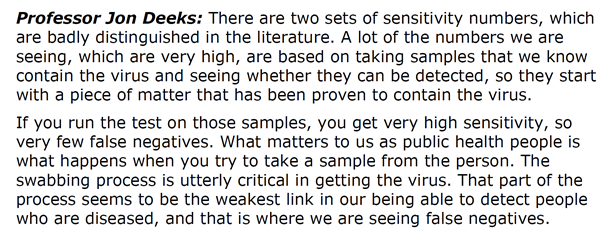AGREE - very important that we clearly distinguish between different types of studies. I discussed this at House of Lords select COVID-19 investigation (below - Q52 9th June) and have seen similar confusion across figures for many tests
1/10
https://committees.parliament.uk/work/293/the-science-of-covid19/publications/oral-evidence/ https://twitter.com/AllysonPollock/status/1292061563000623104
1/10
https://committees.parliament.uk/work/293/the-science-of-covid19/publications/oral-evidence/ https://twitter.com/AllysonPollock/status/1292061563000623104
Not so clear this is due to profession, but "pathway" of studies exist - vary on what the participants/samples are, what the target condition is (and ref std), what RQ is, and what conclusions can be drawn. Def need clarified terminology to distinguish.
2/10
2/10
Lab people want tests which are likely to give the correct result for the sample that they have been presented with, and want numbers which tell them that. PH and clinicians want to know how well the test will work in the person/patient in front of them. Which rarely is as well
I tend to use “analytical sens and spec” for the lab values, and reserve “clinical sens and spec” for the values when used in a clinical setting and pathway. But these names are used for other things.
4/10
4/10
e.g. for RNA/antigen tests: 1st studies of test sens done in spiked samples; 2nd studies done in remnant samples – both answer RQ of whether test detects virus if it is in sample. To me this is part of “analytical sensitivity”. Sens values tend to be very high.
5/10
5/10
But PH/clinical key RQ is whether the test detects virus in infected people. Involves aspects of time test is taken and sampling – sens is much lower as tests don’t work when done at wrong time, and swabbing will miss viral matter in some people. Need to be "pragmatic"
6/10
6/10
Also depends on the distribution of viral load – tests are more likely to give false negatives in when viral load lower – so studies must recruit a typical sample (not just hospitalised patients). Will differ for symptomatic and asymptomatics
7/10
7/10
WHO and China CDC COVID-19 case defns DO INCLUDE RT-PCR negative COVID-19 cases – so another key concern is whether these are included in study
8/10
8/10
Other issues for spec estimation – are they based on comparing with known –ves and potential cross-contaminants (analytical Q) or are they comparing with a representative sample of people in the pathway who do not have COVID-19 (clinical Q).
9/10
9/10
Twitter not really the best medium for this discussion! Royal Statistical Society has set up a working group - hopefully their output will clarify
10/10
10/10

 Read on Twitter
Read on Twitter


